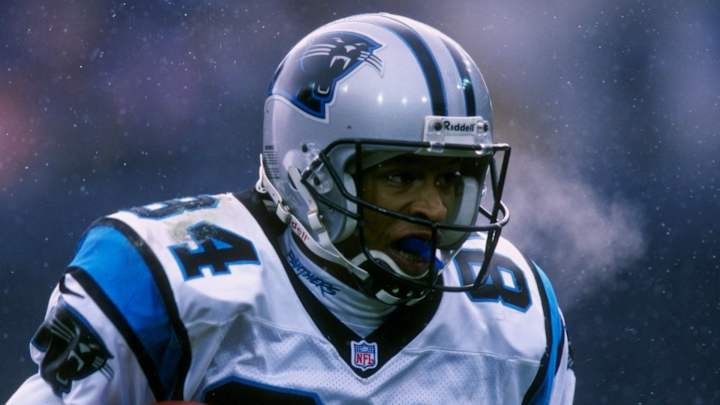A Dark Chapter in Panthers Draft History: The Rae Carruth Story
The history of the NFL is filled with stories of draft-day misfires—players who never lived up to their potential on the field. But few stories are as haunting, tragic, and unforgettable as that of Rae Carruth, a former wide receiver whose fall from grace became one of the darkest episodes in professional football history. For the Carolina Panthers, who selected him with high hopes, Carruth remains the most painful example of a promising athlete whose personal life would overshadow and ultimately destroy his career.
Rae Carruth entered the 1997 NFL Draft with strong credentials. Coming out of the University of Colorado, he had posted over 1,000 receiving yards in each of his last two collegiate seasons, drawing interest from several teams in need of a dynamic pass-catcher. The Carolina Panthers, then a relatively new franchise in the league, used their first-round pick—27th overall—to bring Carruth on board, believing he could be a cornerstone of their offense.
Initially, things seemed to be going well. Carruth had a solid rookie season, hauling in 44 receptions for 545 yards and four touchdowns. His speed and route-running ability gave Carolina’s offense an added dimension, and expectations for his development were high. Yet, behind the scenes, all was not well.
Injuries soon started to derail his progress on the field. He missed the majority of his second season due to physical setbacks, stalling the momentum from his rookie campaign. However, it wasn’t just the injuries that concerned the Panthers’ coaching staff and teammates. Reports began to circulate that Carruth’s behavior in the locker room was problematic. He was seen as increasingly distant, difficult to communicate with, and resistant to guidance. What had once been interpreted as confidence now looked more like arrogance—or worse, a lack of discipline.
But no one could have predicted just how far Carruth would fall.
In 1999, his hidden life came to light in a way that horrified not just the Panthers organization, but the entire sports world. Carruth was arrested and charged in connection with the murder of Cherica Adams, a 24-year-old woman who was pregnant with his child. According to police reports and subsequent court testimony, Carruth had orchestrated a plot to have Adams killed, reportedly to avoid paying child support and responsibilities tied to fatherhood.
Adams was shot in her car in Charlotte, North Carolina, while on the phone with 911. She managed to tell the emergency operator that Carruth had been driving in front of her and had suddenly stopped to block her vehicle, allowing a gunman to approach and shoot into her car. Miraculously, her unborn child survived after an emergency C-section, though the baby—named Chancellor Lee Adams—was born with cerebral palsy due to lack of oxygen during the attack.
Cherica Adams, however, succumbed to her injuries a month later.
Carruth initially fled the scene and was later found hiding in the trunk of a car in Tennessee, leading to a nationwide manhunt. His arrest shocked the nation and turned a once-promising NFL career into a criminal case that captivated—and appalled—the public. The image of a professional athlete, once seen as a role model, now entangled in a cold-blooded murder plot, raised questions about character evaluations in the draft process and the risks of ignoring red flags for athletic performance.
During his trial, prosecutors painted Carruth as the mastermind behind the murder, hiring a hitman and arranging the entire attack. The defense attempted to argue that Carruth feared for his career and reputation, suggesting that the crime spiraled out of control. Despite this, Carruth was convicted of conspiracy to commit murder, shooting into an occupied vehicle, and using an instrument to destroy an unborn child. He was sentenced to nearly 19 years in prison.
Carruth was released from prison in 2018 after serving 17 years. Upon his release, he issued a public apology to the family of Cherica Adams and expressed a desire to reconnect with his son, Chancellor. However, his apology was met with understandable skepticism and rejection from Adams’ family, especially Cherica’s mother, Saundra, who had raised Chancellor with love and determination in the aftermath of the tragedy.
In the years since the incident, Carruth’s name has become a cautionary tale in the NFL. While teams regularly take chances on talented players with questionable pasts, the Carruth case serves as a reminder that a player’s character must be weighed just as heavily as their statistics. No team wants to relive the nightmare that the Panthers endured with Carruth—a first-round investment that turned into one of the most devastating and infamous stories in sports history.
The broader impact of the case also extends to how professional sports leagues screen athletes during the draft process. Today, background checks, psychological evaluations, and character assessments are more rigorous than ever before, driven in part by situations like Carruth’s. Yet, even the most thorough vetting can’t always predict what someone may be capable of off the field.
While Carruth’s playing days are long gone, his legacy continues—though not in highlight reels or hall of fame discussions. Instead, it’s a legacy of what can happen when unchecked ego, personal turmoil, and poor decisions spiral into something unthinkable. For the Panthers, the stain left by Carruth’s time with the team remains. His story is frequently cited as the most catastrophic draft pick not only in the franchise’s history but perhaps in all of professional football.
The pain of that moment still lingers in Carolina. The image of a young woman gunned down, the sight of her brave son battling the consequences every day, and the utter disbelief of seeing a promising athlete throw everything away—these are the haunting memories left behind.
Nobody who lived through it—whether fans, teammates, or family members—will ever forget Rae Carruth. His story is a grim chapter in NFL history that illustrates how football, for all its glory and celebration, can sometimes intersect with tragic human failure. It serves as a stark reminder that beyond the stadium lights and roaring crowds, the choices people make off the field carry consequences far more lasting than any game ever could.



